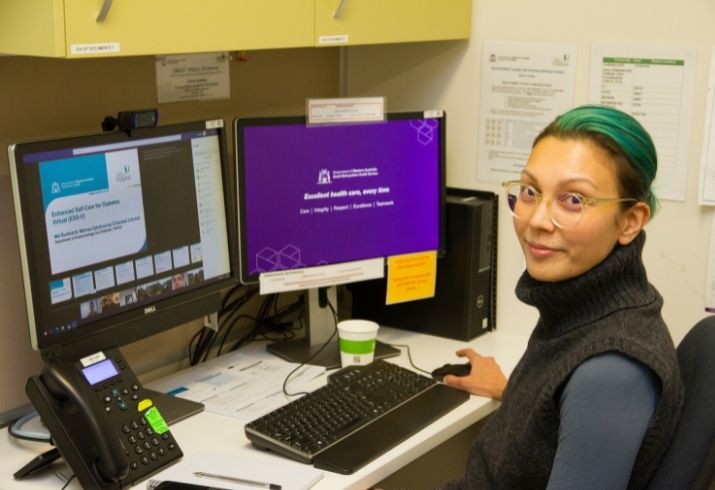West Australian first virtual behaviour therapy program for type 1 diabetes launched
 ESD Program Clinical Lead and FSFHG Senior Clinical Psychologist Dr Melanie Burkhardt in the first virtual session with patients and staff.
ESD Program Clinical Lead and FSFHG Senior Clinical Psychologist Dr Melanie Burkhardt in the first virtual session with patients and staff.
Fiona Stanley Fremantle Hospitals Group (FSFHG) has launched its first virtual behavioural group therapy program - Enhanced Self-care for Diabetes (ESD), specially designed for people living with type-1 diabetes (T1D). Prompted by COVID-19, the normally face-to-face run behavioural group therapy program opened virtually on the first day of the most recent June snap-lockdown.
ESD Program Clinical Lead and FSFHG Senior Clinical Psychologist, Dr Melanie Burkhardt, first developed and implemented the face-to-face behavioural group therapy program at Fremantle Hospital (FH) in 2014, followed by Fiona Stanley Hospital (FSH) in 2015, to support those living with T1D.
“The ESD behavioural group therapy program aims to support individuals with T1D to improve their self-care behaviours, blood glucose control and quality of life, and reduce diabetes-related distress,” Melanie said.
The face-to-face mode of the ESD behavioural group therapy program has received high patient satisfaction ratings and demonstrated a number of benefits to patients’ health and wellbeing.
Melanie said that the ESD behavioural group therapy program was impacted by the COVID-19 pandemic measures in 2020, as the number of groups offered to patients had to be substantially reduced.
“COVID-19 gave us a good reason to adapt and translate ESD to a fully virtual environment,” Melanie said.
The virtual behavioural group therapy program has launched at FSH and is available for suitable patients within the FSH catchment area. The 6-session pilot commenced with six patients in the 23-39 age range who have been living with T1D since they were children.
“T1D is a chronic condition that can be complex to manage, and the burden of self-care rests with the individual. ESD also teaches participants skills in behavioural self-management to improve the way they manage and cope with the demands of T1D,” Melanie said.
The innovative and interactive behavioural group therapy program utilises Microsoft Teams so patients can log in from home or work and see each other as well their treating team.
“Behavioural group therapy programs have an incidental positive social component in them, as hearing experiences from others with T1D can be very validating in that they’re not alone. It is rewarding as health professionals to see the group of peers become proactive about their self-care and collaborate to solve problems and motivate each other with their behaviour change goals,” Melanie said.
“The program is unique in its approach in three main ways, firstly in its application of a behavioural or functional-contextual model to diabetes self-care and psychological distress, the focus on personal diabetes self-care behaviour as therapy targets and the emphasis on behavioural self-management.”
The ESD program is facilitated by a team of diabetes specialists, which include a clinical psychologist, a diabetes nurse educator and diabetes dietician.
The virtual pilot is the first step in developing, implementing and evaluating a fully optimised virtual ESD behavioural group therapy program which could ultimately be rolled out throughout the South Metropolitan Health Service or even state-wide for people with T1D as the first program of its kind in Western Australia.
“It is likely that ESD virtual will become part of the standard program offerings via FSH and has the potential to become a preferred option for patients,” Melanie said.
“Virtual behavioural group therapy programs also have the benefit to patients of reducing the time and costs of traveling to the hospital for appointments, and for the health system by reducing the strain on existing resources and easing pressure on hospital parking.”
The virtual behavioural group therapy program is currently in a pilot phase and will take six months to complete including evaluation and reporting. The ESD project team together with FSH clinical planning will continue work to refine processes and improve the way the virtual program is delivered. Once this phase is complete, the aim will be to run a benchmarking study comparing outcomes between the face-to-face and virtual ESD behavioural group therapy programs in parallel, before the virtual program can be rolled out to the wider community of people with T1D.
Keep up to date with our news and achievements


